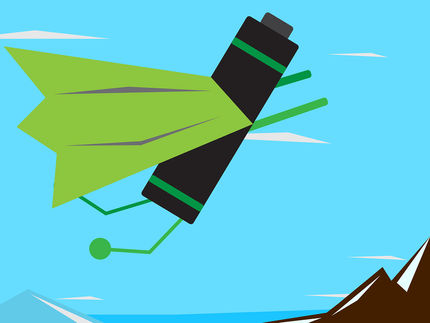Accelerating the Discovery of New Materials with AI
A multi-agent system acts as a creative partner, driving the development of durable, sustainable next-generation batteries
Advertisement
In a world-first for battery research, researchers from the University of Bayreuth and the Hong Kong University of Science and Technology have employed a so-called multi-agent network in battery design. This AI-based tool enables the rapid generation of promising proposals for new battery materials, thereby advancing the development of long-lasting and sustainable next-generation batteries. The researchers report their findings in the journal Advanced Materials.
The electrolyte in a battery, which transports ions between the electrodes and thus enables the flow of electricity, is crucial for the battery’s lifespan, safety, and overall performance. The discovery of new electrolyte materials is therefore one of the most important drivers for advancing the global energy transition. Identifying suitable electrolytes, however, requires extensive research, in which promising material compositions must first be found and then experimentally tested – a process that often takes weeks or even months. Using an AI-based approach, researchers led by Prof. Dr. Francesco Ciucci from the Chair of Electrode Design for Electrochemical Energy Storage Devices at the Bavarian Centre for Battery Technology (BayBatt) at the University of Bayreuth have taken the first step towards accelerating this process.
To this end, the Bayreuth researchers, in collaboration with the Hong Kong University of Science and Technology, developed a multi-agent network based on large language models such as ChatGPT. It consists of two specialised units (software agents) that work together to solve a problem or research question. One agent has a broad overview of the existing literature on the topic, while the other has access to in-depth, specialised knowledge. When humans conduct research, sift through information, and weigh up options, it can take weeks or even months to identify a suitable material. The AI, on the other hand, accomplishes this in just a few hours. With this multi-agent system, the team has created a pioneering approach to harnessing AI-driven creativity to accelerate materials discovery.
“Our new multi-agent system acts as a creative scientific partner, with two specialised agents analysing relevant literature. By simulating a scientific debate, the two agents link ideas from their extensive training data and the literature to propose novel electrolyte compositions,” explains Ciucci.
Dr. Matthew J. Robson from the Hong Kong University of Science and Technology adds: “The key takeaway here is the evolution of AI's role in the scientific process. We've demonstrated a new blueprint for scientific research that shifts AI from being a passive tool for data analysis into an active, creative partner that can generate genuinely novel and high-quality hypotheses.”
In a crucial next step, the team translated their research from theory into practice: the multi-agent system proposed several novel, cost-effective, and environmentally friendly electrolyte components for zinc batteries. One of the electrolytes demonstrated outstanding performance in experimental testing, rivalling the most advanced systems in its electrolyte class. The new design demonstrated outstanding durability by completing more than 4,000 charge-discharge cycles. It also established a new fast-charging record within its electrolyte class, providing nearly 20% greater capacity at fast-charging speeds compared to similar electrolytes.
“The proven effectiveness of our multi-agent network is revolutionising the discovery of advanced materials – even beyond battery design,” says Ciucci. “This approach means the initial research phase can be drastically shortened.” The AI network can thus serve as a powerful tool to complement human scientific expertise. Combined with validation through laboratory experiments and the critical judgement of researchers, the promising AI-generated proposals can lead to faster solutions for global challenges.
Original publication
Other news from the department science
Most read news
More news from our other portals
See the theme worlds for related content
Topic World Battery Technology
The topic world Battery Technology combines relevant knowledge in a unique way. Here you will find everything about suppliers and their products, webinars, white papers, catalogs and brochures.

Topic World Battery Technology
The topic world Battery Technology combines relevant knowledge in a unique way. Here you will find everything about suppliers and their products, webinars, white papers, catalogs and brochures.






























































